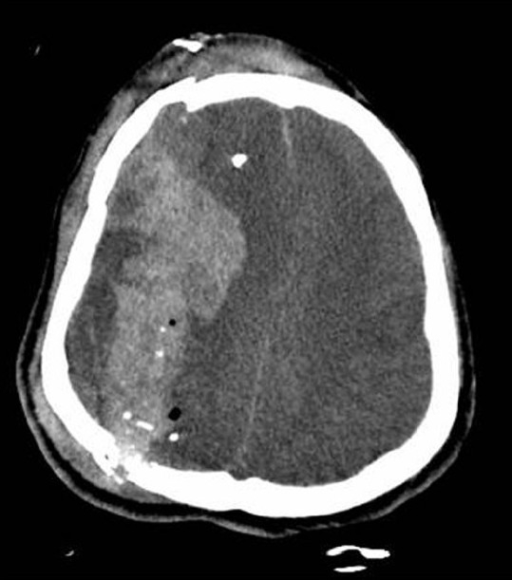Playlist
Show Playlist
Hide Playlist
Intraventricular Hemorrhage (IVH)
-
Slides Prematurity Pediatrics.pdf
-
Download Lecture Overview
00:01 So let’s move on to the next issue of prematurity which is intraventricular hemorrhage. 00:06 This is bleeding in the brain which can happen usually as a result of difficulty around the peripartum period. 00:12 Perhaps, there was some late decelerations or placenta abrupta or something. 00:18 Basically, this is bleeding at the subependymal germinal matrix of the brain. 00:23 This happens in 25-40% of premature infants. 00:28 So we routinely do head ultrasounds on all of these kids. 00:33 There are certain risk factors for worse bleeds. 00:35 One is extreme prematurity and the other is hypotension, hypothermia, metabolic acidosis or thrombocytopenia in the peripartum period. 00:45 So these can vary from being essentially asymptomatic and having no consequences at all to being completely catastrophic. 00:55 Eighty percent will occur within the first three days after birth. 00:59 So the symptoms patients have if they’re having a symptomatic IVH, may be apnea where they hold their breath. 01:06 They may have a seizure and the seizures can be very subtle. 01:10 They may have sudden anemia because they bled into their brain. 01:13 They may develop hypotension from blood loss or they may develop hypertension from increased ICP. 01:22 We generally breakdown these bleeds into how severe they are because it give us some prognostic ability. 01:29 Grade 1 hemorrhage is confined to the germinal matrix, representing the mildest form of IVH. 01:36 A grade 2 bleed involves up to 50% of the ventricle. 01:42 A grade 3 bleed is more than 50% of the ventricle and a grade 4 bleed such as you can see here with that white stuff, that’s all blood, that’s a parenchymal bleed. 01:52 It’s bled into the parenchyma and these have a much worse prognosis. 01:57 Rarely, something like this can show up where the blood has actually prevented drainage of the CSF out of the ventricle and this baby may well need a shunt and has hydrocephalus. 02:09 So the prognosis, like I said, depends on the severity of bleed. 02:13 Generally, grade 1s do well. 02:15 A grade 3, about 60% of those patients will have neurodevelopmental problems. 02:21 In grade 4, 90% will have severe sequelae. 02:25 This is a bad prognostic finding. 02:28 In a severe bleed, where there is increased IVH, this is a surgical emergency, and typically the neurosurgeon will put in an extraventricular drainage device to relieve the pressure. 02:41 In more mild bleeds, you might treat supportively. It really depends on the IVH. 02:48 It also depends on when you pick it up. 02:52 So that’s my review of the common complications of prematurity in infants. 02:58 Thanks for your time.
About the Lecture
The lecture Intraventricular Hemorrhage (IVH) by Brian Alverson, MD is from the course Neonatology (Newborn Medicine).
Included Quiz Questions
A neonate has intraventricular hemorrhage (IVH) that fills 30% of the ventricle. What is the severity grade in this patient?
- Grade 2
- Grade 3
- Grade 1
- Grade 4
- Grade 5
Which of the following clinical manifestations is least likely associated with germinal matrix hemorrhage/IVH?
- Hyperbilirubinemia
- Hypotension
- No symptoms
- Hypertension
- Seizure
Customer reviews
4,0 of 5 stars
| 5 Stars |
|
1 |
| 4 Stars |
|
0 |
| 3 Stars |
|
1 |
| 2 Stars |
|
0 |
| 1 Star |
|
0 |
Hay problema con la traducción en los últimos minutos. En la parte de actualización no hay una traducción y se adelanta la traducción
Excellent lecture as usual. I feel more confident to understand the complications around prematurity.




